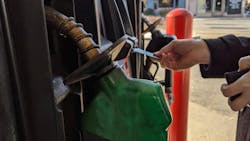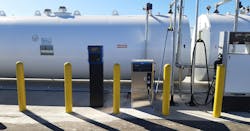Fueling fraudsters: How to combat fuel theft
When it comes to avoiding cargo theft, fleets have a veritable army of tools at their disposal, from trailer cameras and door sensors to geofencing and trackers. But there’s another form of fleet theft that’s both harder to track and prevent: fuel fraud.
“[Fuel fraud comes] in waves,” said Carleen Moreira, sr. director of Fleet and Administrative Services at Lily Transportation, an over-the-road logistics company. “I could go a couple of months and get one or two a day, and then get a lull, and then it just pops up again.”
According to a 2023 Motive study, almost 55% of fleet operators struggle to detect when they’re experiencing fuel fraud, and 49% estimate that up to 5% of their fuel spend is fraudulent. But that 5% can equate to $505,512 of expenses based on a $10,110,237 estimated annual fuel expenditure for 200 truck fleet, the report noted.
And that 5% could be higher, according to Michael Boyd, senior management of fleet product management, Dover Fueling Solutions. “Based on some of the feedback that we've had, both from end users as well as different fleet networks and card brands, we estimate fraud and or the loss of fuel on the fleet side to be somewhere between six to 10% of fuel going through a site,” he explained.
And the costs of fuel theft go beyond the financial impact to fleets’ bottom line when they’re buying more fuel than they should be.
“Number one, you're going to run into shortages that shouldn't exist,” Boyd commented. “On top of that, you're also going to see soft issues like an erosion of trust.”
Understanding the tactics bad actors use to fleece fleets can help them prevent it, with a little technological help, too.
Types of fuel fraud
There are three main kinds of fuel fraud a fleet might experience, including card skimming or phishing, where bad actors steal fuel card data to access fuel funds; employee theft where workers inflate their miles or fuel transactions; or out-of-policy spending, which includes card sharing or using fuel cards for personal expenses. Fleets are especially vulnerable to all of these tactics because their fuel stations are often more remote than the public’s retail sites, and may be less equipped with accompanying attendants and cameras.
“Lots of fraud can happen this way without really clear visuals in terms of how those things are happening,” Boyd added. And the situation is complicated by the various locations a fleet might need to fuel up as they make deliveries, making it difficult to tell which transactions are fraudulent and which are legitimate.
As an example, Lily Transportation’s Moreira had to grapple with a bad bout of fuel fraud about six years ago, and her difficulties were compounded because their fuel card company couldn’t tell her where their card was being accessed.
“It was almost every day that we were having an issue, and I wanted to know where,” Moreira recalled. “Was [fuel fraud] happening in New Jersey or California? They couldn't provide me with that information, so that was very difficult to reel in.”
Read more: How to protect your fleet from fuel fraud
Beyond struggling to pinpoint where fraudulent transactions were happening, Lily Transportation’s old fuel card company would only let the fleet know a charge seemed incorrect five to six days after the fact without shutting down the card in question. Eventually, the only way they could clamp down on the theft was by forcing drivers to go into gas stations to buy fuel instead of using the exterior card readers.
According to Boyd, this kind of card skimming is usually the most common kind of fuel theft. But there are several ways fleets can protect their fuel cards. For Lily Transportation, they switched providers for added security.
“We're fortunate in the fact that the card service that we use, EFS Wex, has programs in place where they catch the fraud nine out of 10 times,” Moreira said. “They also have two-factor approval. If we have an area that’s having a lot of issues with fraud, we can put that in place as well.”
They can also decline fuel transactions remotely if they seem suspicious, such as if a driver has largely been fueling up in Las Vegas but suddenly appears to be in Arizona. Although, Moreira commented, this does sometimes cause issues for when a driver really has changed location and needs to top off their tank.
“Sometimes it can be a hindrance because now we’ve got a driver that could be out and needing fuel, but I would rather have them call in and figure out another way to get him fuel or override the card, whatever the case may be, rather than have a fraudulent transaction go through, since the price of diesel isn't cheap,” she stated.
Overall, two-factor authentication has advanced significantly, according to Boyd, whether they come from a fleet’s bank or the fueling site itself.
“Those can be anything from the odometer reading on the vehicle itself all the way down to what we joke will be the driver’s shoe size,” he said. “Those prompts are pretty much controlled by the site in terms of how they want to see those things operated.”
In some cases, customers have specific cards for both the driver and the vehicle, requiring two authentications before they can fuel up. Another option includes added security along with two-factor approval.
“One of the largest market trends that we've seen over the last couple of years specifically are a lot of fleets migrating to using more EMV and chip and PIN technology,” Boyd commented. “That helps remove some of the concerns from a skimming standpoint because it's significantly more difficult to steal that information off those cards.”
While fuel fraud may remain an issue for the transportation sector, advancements like these can help fleets keep money in their pockets instead of in the tanks of bad actors.
About the Author

Alex Keenan
Alex Keenan is an Associate Editor for Fleet Maintenance magazine. She has written on a variety of topics for the past several years and recently joined the transportation industry, reviewing content covering technician challenges and breaking industry news. She holds a bachelor's degree in English from Colorado State University in Fort Collins, Colorado.

